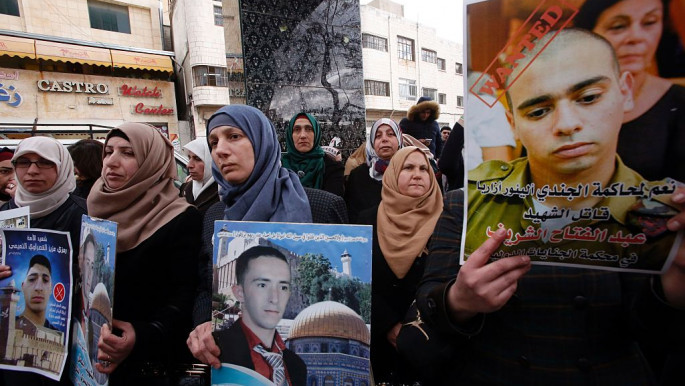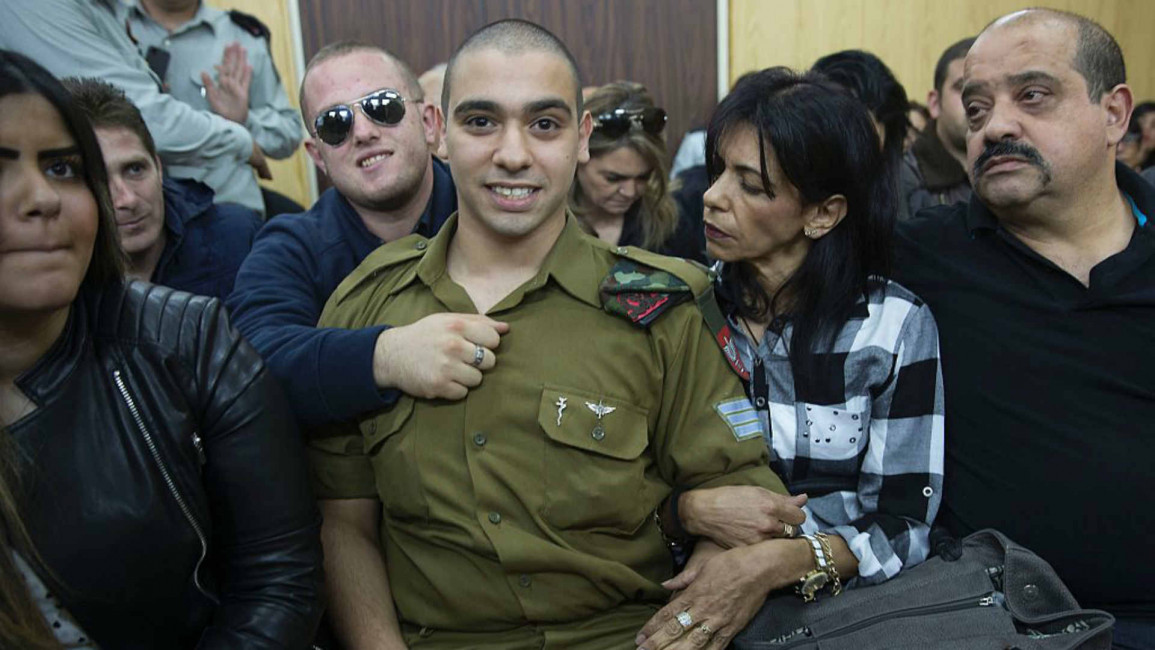
Elor Azaria's 18-month sentence is an insult to Palestinians
Several soldiers and settlers are present; there are two Israeli ambulances on the scene, but no one makes any attempt to aid al-Sharif who is clearly wounded.
Instead, the Israeli soldier we now know is Elor Azaria walks over to al-Sharif and shoots him at close range in the head. Blood pours out of him and down the hill.
This is the sequence of events we know led up to the death of al-Sharif thanks to Imad Abu Shamsiyya, a videographer who filmed it on his mobile phone and shared it through the human rights organisation B'Tselem who he volunteers for.
Azaria was given just 18 months despite the fact that the footage shows quite clearly that he did not shoot al-Sharif out of fear for his safety, as he claimed in court. The former soldier was due to begin serving his prison sentence this week, but has asked for the start to be delayed until Chief of General Staff of the Israel Defense Forces Gadi Eisenkot responds to his request to commute the sentence to community service.
Azaria had been called to administer medical assistance to al-Sharif but fired a bullet into his head as an act of revenge, a fact that even the court acknowledges.
Some seriously flaky evidence was put forward at the initial trial. Al-Sharif was accused along with his friend Ramzi al-Qasrawi - who was also shot but not on camera - of stabbing a soldier, yet footage emerged of a settler kicking a knife closer to al-Sharif.
 |
If a Palestinian life is worth 18 months in prison – if that – what is an Israeli life worth? |  |
This is not the first time the Israeli army have been recorded meddling with evidence. In 2015 al-Haq human rights organisation opened an investigation into the shooting of Fadel al-Kawasmeh on Shuhada Street, also in Hebron. From their balcony the Sharabati family taped soldiers planting a knife on him.
If a Palestinian life is worth 18 months in prison – if that – what is an Israeli life worth? As al-Sharif's father Yusri pointed out a Palestinian child gets longer jail time for throwing stones than Azaria received for his cold-blooded execution.
Take the case of Muhammed Ahmad Jaber and Murad Red Alqam. In the same month Azaria shot al-Sharif in the head, Jaber and Alqam each received three-year prison sentences for throwing stones yet they were just 14-years-old.
 |
|
| Rajaa (centre), holds a poster of her son Abdul Fatah al-Sharif who was killed by Elor Azaria as he lay wounded on the ground posing no apparent threat. [AFP] |
Last year 21-year-old Ahmad Yasser Baraghithi was sentenced to eight years in prison for the same offence.
In total Israeli forces killed 32 Palestinian children in the West Bank last year - the highest number in a decade - as they returned from school, parties or gathered at protests.
According to the Middle East Children's Alliance, in 2013 one Palestinian child had been killed every three days by Israel for the past 13 years, yet the soldiers who are responsible are rarely held accountable. If they were, this would risk putting them off protecting Israel's settlement enterprise.
| Read more: Elor Azaria's gun: Redefining the rifts in Israeli society | |
In 2014 Israeli soldier Ben Dery shot and killed 17-year-old Nadim Nuwara. Like al-Sharif's death his murder was caught on camera, yet just months after Dery was sentenced to manslaughter rumours were already circulating that the case was likely to be dropped against him.
From the top down this impunity is not only encouraged but it is facilitated. Not long after Azaria's sentencing, Israeli prime minister Netanyahu called for him to be pardoned, professing that it was a "difficult and painful" day. In fact Azaria became a national hero and was named man of the year by Israel's Channel 10.
Israeli pop star Ariel Zilber wrote and performed a song about him which included the lyrics, "Elor Azaria, hero of Israel". His face adorned tote bags which could be purchased at the supermarket chain Rami Levy; some even dressed their children up as the soldier for a Jewish festival.
 |
Israeli forces killed 32 Palestinian children in the West Bank last year - the highest number in a decade |  |
Netanyahu has made no attempt to hide his affinity for people who murder Palestinians. Recently he posted pictures of himself on social media embracing the Shin Bet officer who shot dead two Palestinians in Jordan.
While these soldiers are placed on pedestals Shamsiyya - the activist who filmed al-Sharif's death - has received hundreds of death threats, been told his death is inevitable, had his house broken into and been pressured to change his testimony.
The Israeli government routinely arbitrarily detains Palestinian activists and blocks international human rights workers from entering the country. The most recent manifestation of this is the BDS law that prevents entry to Israel for foreign activists who support the boycott.
Threatening Shamsiyya for exposing al-Sharif's murder, failing to oversee due process and lionising Azaria for murdering a Palestinian is an insult to al-Sharif's family and the thousands of other Palestinians who regularly die at the hands of the Israeli army.
Amelia Smith is a London-based journalist who has a special interest in Middle East politics, art and culture. She is editor of The Arab Spring Five Years On. Follow her on Twitter: @amyinthedesert
Opinions expressed in this article remain those of the author and do not necessarily represent those of The New Arab, its editorial board or staff.


![Minnesota Tim Walz is working to court Muslim voters. [Getty]](/sites/default/files/styles/image_684x385/public/2169747529.jpeg?h=a5f2f23a&itok=b63Wif2V)




